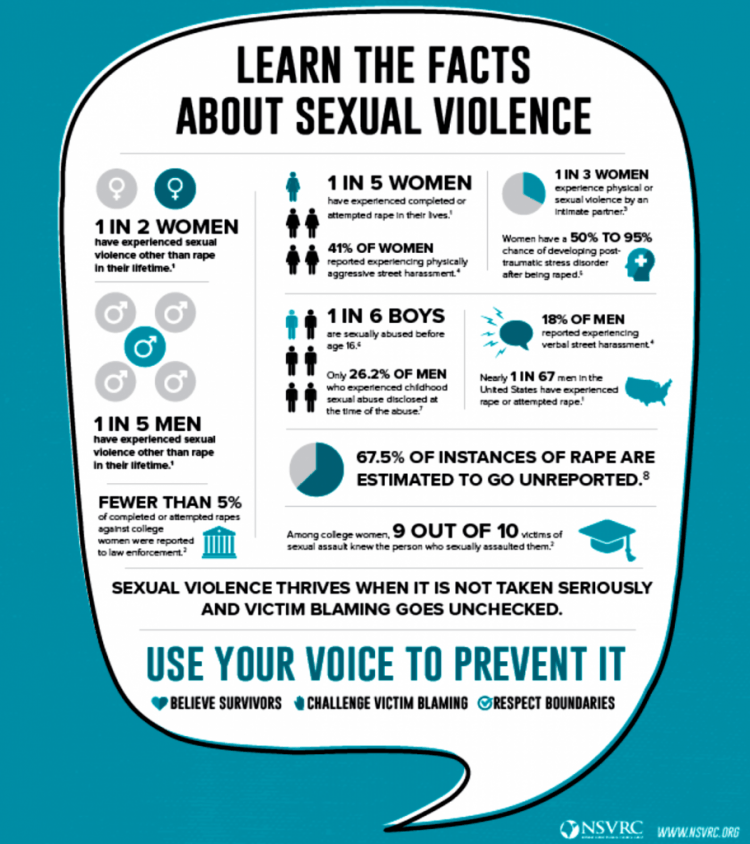March 27, 2023
Supporting sexual assault survivors
 April is sexual assault awareness month, an annual campaign to raise public awareness about sexual assault and educate communities and individuals on how to prevent sexual violence.
April is sexual assault awareness month, an annual campaign to raise public awareness about sexual assault and educate communities and individuals on how to prevent sexual violence.
Sexual violence happens in every community and affects people of all ages, races, genders, and religions — with and without disabilities. Sexual violence is any type of unwanted sexual contact. This includes words and actions of a sexual nature against a person’s will and without their consent. A person may use force, threats, manipulation or coercion to commit sexual violence.
The statistics are shocking. According to the National Sexual Violence Resource Center:
- Someone is sexually assaulted every 68 seconds in the U.S.
- One in five women in the United States experienced completed or attempted rape during their lifetime.
- One in three female victims of completed or attempted rape experienced it for the first time between the ages of 11 and 17.
- Nearly a quarter of men in the U.S. experienced some form of contact sexual violence in their lifetime.
- Almost one in four undergraduate women experienced sexual assault or misconduct at 33 of the nation’s major universities.
- On average, about two out of three sexual assaults go unreported.
- Victims often know the person who sexually assaulted them.
No means no: Consent is an agreement that is willfully given without any external pressure or factors. Consent must be clearly and freely communicated between the parties involved in all sexual activities and consent can be withdrawn at any time.
It’s never too early to talk with children about consent and bodily autonomy
The theme of Sexual Assault Awareness Month 2023 is Drawing Connections: Prevention Demands Equity. The campaign calls on individuals, communities, organizations, and institutions to build racial equity and respect by understanding how forms of oppression (including racism, sexism, homophobia, ableism, adultism, ageism, and others) create a culture in which inequality thrives and violence is seen as normal.
Learn more
Building safe online communities: Online or virtual sexual abuse is any type of sexual harassment, exploitation, or abuse that takes place through screens. It can take many forms, including grooming or leading to in-person abuse, and can be just as damaging to victims as in-person abuse.
If you observe harmful behaviors online:
- Report inappropriate content. If you see personal or violent content on a social media platform, you can report it to the platform it was shared on (Instagram, Facebook, YouTube, etc.) in order to have it flagged or removed. Different platforms have their own guidelines on what counts as inappropriate and what actions they will take, but that process starts with you making a report.
- Respond when you see harmful comments. When you see comments that blame victims for what happened to them, you can respond by refocusing accountability on the perpetrator. While you might not change the mind of the person who left the comment, others will see that not everyone agrees with them.
- Show your support to victims of online harassment. Check in with the person that comments have been directed at to show your support. You can also consider volunteering to be a moderator in certain contexts to help prevent future harassment.
Fierce compassion: Meet gender equity and justice advocate Lauren Lichty: This People of UW profile looks at the work of UW Bothell associate professor Lauren Lichty, an expert in prevention and response to relationship and sexual violence.
Stop the Hurt is an educational resource for all people as they seek to develop positive relationships with peers, partners, family, and themselves. We believe all relationships should be based on mutual respect and equality. Our hope is to create conversations around consent, healthy relationships, peaceful communication, and self-compassion.
Supporting victims of sexual assault
While everyone’s experience and reaction to sexual assault is different, there are some practices that can help in supporting loved ones. It is important to keep the space judgment free. This information should remain confidential unless otherwise indicated.
It is essential to be a good listener, acknowledging the courage it takes to come forward and allowing space to talk.
Be an active bystander: Being an active bystander means intervening when you hear comments or see behaviors that support sexual violence and speaking up if you hear sexist jokes or comments. Check out Right to Be’s active bystander trainings.
Here are three steps for helping a victim connect with the right resources:
Validate: Thank them for trusting you. Your job is not to investigate, but to support them. You could say something like, “Thank you for sharing this with me. I know this is so difficult. I want to help connect you to the right people and don’t want to ask a lot of questions, but do you have any immediate safety concerns? How can I support you right now?”
Consult: If you need immediate assistance, call 206-543-9337 to speak with an advocate or SafeCampus (206-685-SAFE) if it’s after business hours.
Refer: Advise them to connect with a UW confidential advocate (contact info below) or another available resource.
Remind the survivor that they are not alone and continue to offer support.
Resources for sexual assault survivors at UW
If you have experienced sexual assault, relationship violence, domestic violence, stalking, sexual harassment, related retaliation or other forms of sexual misconduct, you can learn more about your rights and the resources available to you at the University’s Sexual Assault Resources webpage.
Safe Campus is UW’s violence-prevention and response program supporting students, faculty and community members in preventing violence.
An important resource is the UW’s confidential advocates. If you want to talk to someone immediately, you can always call SafeCampus.
Sexual assault exam information: Most area hospitals and clinics provide free Sexual Assault Forensic Evidence Collection Exams (also called a SANE exam or a Rape Kit). Trained nurses will conduct a forensic examination, provide emergency contraception, and treat potential STIs. The sooner treatment is received, the better: evidence is best collected with 120 hours or 5 days.
- Receiving this medical care does not trigger the involvement of law enforcement unless the victim requests it.
- More information on Sexual Assault Forensic Care in the state of Washington can be found here.
- What to expect during a sexual assault forensic exam.
Confidential advocates offer a confidential place for students and employees to get support, information, and assistance for survivors of sexual assault, sexual harassment, stalking, and intimate partner violence.
-
- Seattle campus advocate: Livewell
- Tacoma campus advocate: UW Tacoma Assistant Director for Student Advocacy and Support
- Bothell campus advocate: UW Bothell Violence Prevention and Advocacy Program Manager
- For employee advocates email: lwadvoc@uw.edu (serves all UW campuses)
The advocates can help even if the incident didn’t happen at UW. It doesn’t matter where or when it happened, and they have experience with survivors of childhood sexual abuse.
And, the client doesn’t need to be the victim. Student bystanders often want to know how to support a friend and get them connected to the right resources. And faculty and staff can always consult with an advocate. If there’s a student you’re concerned about because you’ve noticed changes in their demeanor, or they’ve been hinting that things aren’t OK in their life, you can ask for advice.
Resources for sexual assault survivors off campus
- National Sexual Abuse Hotline (Available 24/7): 1-800-656-4673
- Harborview Abuse and Trauma Center: provides 24/7 care for sexual assault and medical forensic consultation.
- The Northwest Network of Bi, Trans, Lesbian & Gay Survivors of Abuse: works to end abuse and offers support groups, advocacy-based counseling, safety and support planning, basic legal advocacy, and other resources.
- King County Sexual Assault Resource Center: serves survivors and their families throughout King County with a 24/7 hotline to offer support and provide information to help in deciding next steps
- Hotline: 888-998-6423
- En Español: 425-282-0324
Other Ways to Help
Consider making a one-time gift or setting up monthly payroll deduction through the UWCFD to one of our member organizations actively working to prevent sexual violence and help survivors:
Sexual Violence Law Center (charity code 1482958): is a survivor-led nonprofit law firm that protects the privacy, safety and civil rights of survivors. Our advocacy is trauma-informed and based in race and gender equity principles.
Harborview Center for Sexual Assault and Traumatic Stress (charity code 0319580): provides 24/7 care for sexual assault and medical forensic consultation. Also offers therapy services and Foster Care Assessment Program (FCAP).
King County Sexual Assault Resource Center (charity code 0316249): serves survivors and their families throughout King County with a 24/7 hotline to offer support and provide information to aid in deciding next steps.
Abused Deaf Women’s Advocacy Services (charity code 0316138): provides community education, and advocacy on system and policy issues while empowering Deaf and Deafblind sexual assault survivors
Rape, Abuse, Incest National Network (RAINN) (charity code 0316278): operates National Sexual Assault Hotline and DoD Safe Helpline as well as offering programs to prevent sexual violence, help survivors, and bring justice to offenders.
End Violence Against Women (EVAW) International (charity code 1478206): educates responders to gender-based violence through trainings, consultation, developing resource material, education policymakers, and conducting research to strengthen the response of the criminal justice system and other professionals.
